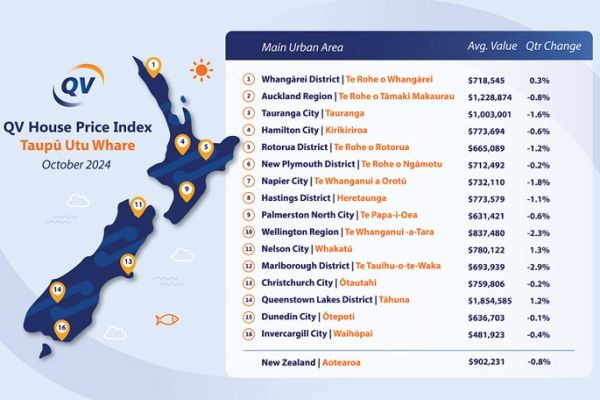New Zealand's land laws have long been a topic of intrigue and debate, often shrouded in complexity and misconceptions. For many Kiwis, the intricacies of property ownership, foreign investment, and zoning regulations remain unclear. This article aims to shed light on the lesser-known aspects of New Zealand's land laws, providing travel experts with a comprehensive understanding of the legal landscape, its economic implications, and the opportunities and challenges it presents.
The Importance of Understanding New Zealand's Land Laws
New Zealand's land laws are not just a local concern; they have significant implications for the country's economy and its position in the global market. A report by the Ministry of Business, Innovation, and Employment (MBIE) highlighted that real estate is a major driver of New Zealand's economy, contributing approximately 15% to the GDP in recent years. This underscores the need for travel experts and investors to have a nuanced understanding of the country's land regulations.
Case Study: The Impact of Foreign Investment Restrictions
In 2018, the Overseas Investment Amendment Act was introduced, significantly impacting foreign investors' ability to purchase residential property in New Zealand. This legislation aimed to curb the rapid increase in property prices and make housing more affordable for locals.
- Problem: Prior to the amendment, foreign buyers were contributing to a housing shortage and driving up property prices, making it difficult for New Zealanders to enter the housing market.
- Action: The government introduced restrictions on foreign ownership of residential properties, allowing only those who are New Zealand citizens or residents to purchase homes.
- Result: Following the implementation, there was a noticeable slowdown in the housing market, with property price growth stabilizing. This move was supported by data from Stats NZ, which showed a reduction in the number of homes sold to overseas buyers.
- Takeaway: For travel experts and investors, understanding these restrictions is crucial when advising clients on property investments in New Zealand.
Expert Insights: Navigating Zoning Laws
One of the less discussed aspects of New Zealand’s land laws is zoning regulations, which dictate land use and development. Zoning can significantly impact property values and development opportunities, and it's essential for travel experts to understand these regulations to provide accurate advice.
According to Dr. Andrew Coleman, a land economist at the University of Otago, "Zoning laws in New Zealand are designed to manage urban growth and protect valuable agricultural land. However, they can be a double-edged sword, sometimes stifling development and increasing housing costs due to limited land supply."
Data-Driven Analysis: The Real Estate Market and Land Laws
Statistics from the Reserve Bank of New Zealand reveal that the real estate sector's growth has been uneven, particularly in urban centers like Auckland and Wellington. Here’s a closer look at the data:
- Property prices in Auckland have increased by over 30% in the past five years, partially due to limited land availability and stringent zoning laws.
- Rural areas have experienced slower growth, highlighting the impact of zoning and investment restrictions.
- The Reserve Bank's data also indicates a 15% year-on-year increase in property-related lending, emphasizing the sector's robustness despite regulatory challenges.
These statistics highlight the critical role of land laws in shaping the real estate market and underscore the need for travel experts to stay informed about these regulations.
The Pros and Cons of New Zealand's Land Laws
✅ Pros:
- Stabilized Housing Market: Restrictions on foreign ownership have helped stabilize property prices, making housing more accessible for New Zealanders.
- Preservation of Agricultural Land: Zoning laws protect valuable agricultural areas, ensuring sustainable land use.
- Regulatory Clarity: Clear regulations provide a stable environment for domestic investors.
❌ Cons:
- Limited Foreign Investment: Restrictions can deter foreign investment, potentially slowing economic growth.
- Development Challenges: Strict zoning laws can stifle development, leading to housing shortages in high-demand areas.
- Complexity: Navigating these laws can be challenging for investors unfamiliar with New Zealand's legal framework.
Debunking Myths About New Zealand's Land Laws
There are several misconceptions about New Zealand’s land laws that can mislead potential investors and travelers:
- Myth: "Anyone can buy property in New Zealand without restrictions." Reality: Foreign investment is heavily regulated, with strict criteria for non-residents to purchase property.
- Myth: "Zoning laws are the same across all regions." Reality: Zoning regulations vary significantly between regions, impacting development opportunities and property values differently.
- Myth: "Land laws are static and rarely change." Reality: New Zealand's land laws are dynamic and subject to change, as seen with recent amendments targeting foreign investment.
Future Trends in New Zealand's Land Laws
Looking ahead, several trends could reshape New Zealand's land laws:
- Increased focus on sustainable development, with potential changes to zoning laws to encourage eco-friendly practices.
- Further amendments to foreign investment regulations to balance market stability and economic growth.
- Technological advancements in land management, potentially streamlining the regulatory process and improving transparency.
Conclusion: Navigating New Zealand's Land Laws
Understanding New Zealand's land laws is crucial for travel experts and investors seeking to capitalize on opportunities in the country's real estate market. By staying informed about the latest regulations and trends, you can provide valuable advice to clients and make informed investment decisions.
What’s Your Next Move?
Whether you're advising a client or considering an investment, staying updated on New Zealand's land laws is essential. Join our newsletter for the latest insights and expert analysis on New Zealand's real estate market. Share your thoughts and experiences in the comments below!
People Also Ask (FAQ) investors
- How do New Zealand's land laws impact foreign investors?Foreign investors face strict regulations, limiting residential property purchases to ensure housing affordability for locals.
- What are the biggest misconceptions about New Zealand's land laws?A common myth is unrestricted property purchase for foreigners, but regulations are stringent and vary by region.
Related Search Queries
- New Zealand land ownership laws
- Foreign investment in New Zealand property
- New Zealand zoning regulations
- Real estate market trends in New Zealand
- Impact of land laws on New Zealand's economy































